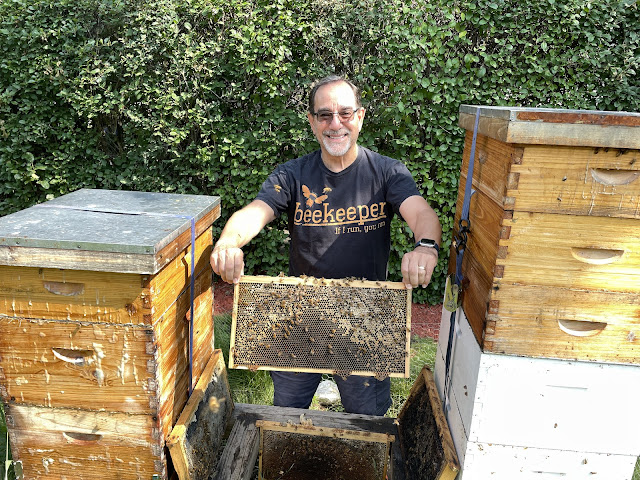 |
| Bob Israel |
We are the architects of our own happiness. Or sorrow. I think we forget that. It's too easy to offload responsibility for our lives onto fate, circumstance, others. To sit on your hands and complain. If you don't like what's going on right now, get busy and change it.
I'm thinking of Monday morning. I'd been working for a couple hours, but hit a wall. It was about 9:45 a.m. I looked up, a little stunned, to find myself sitting at a desk, writing stuff. How did this happen? This is where working in a place with other people would be helpful. You could get up, get coffee, wander over and talk to one of those other people.
But I work alone. I groped to think of someone to call, but came up empty.
Drifting over to Facebook — which gets a bad reputation, but definitely has its uses — I noticed Bob Israel, a Northbrook trustee I'd met once after a recent village board meeting. He'd posted a photo of himself in a beekeeper's mask. Plus a trio of honey jars with homemade labels.

Posted 11 minutes earlier.
Why the heck not?
I grabbed $15 and the car keys. Google Maps told me Bob and his hives were a five minute drive or ... a 10 minute bike ride. I hopped on the old Schwinn. Always choose the more strenuous option. Riding a bike helps.
Bob has several hives and about 125,000 bees in his back yard. He's been keeping bees for about five years.
"The neighbors were initially freaked out," he said. "But then they realized their gardens have been better than ever. One of my neighbors took out all his grass and put in flowers."
That's true — he'd replaced a section of back lawn with bee balm, daisies and other bee friendly flowers, a gorgeous tableau.
"I started keeping bees because of my concerns about the environment and desire to be more restorative than destructive," he said. "As I took classes and started to learn more about the bee's social structures and began working with the bees, I found it to be both mind-calming and to benefit the flora in my neighborhood — so, effectively my reward is found in a bit of clearing of my mind and a multitude of blooming flowers.
I stood before the hives, admiring them, and Bob directed me off to the right, "out of their flight path." There being nothing flowery about myself, the bees ignored me entirely, as they did Layla, Bob's dog, who practically was jamming her nose into the swarm.
My admiration for bees was sparked in part by Virgil's Georgics, which includes a parody of battles in Iliad, fought by bees, whom he calls "stout warriors in their waxen kingdoms."
Bob refers to his bees as "the girls," which I liked very much. I told him I knew this is correct gendering, as most bees in a hive are female.
"There's some drones," he said.
After 10 or 15 minutes I paid $15 for a pound of honey — the money goes to a worthy charity. Bob wrapped it carefully in a sheet of styrofoam, I put it in my bike basket and donned my helmet. A car pulled into the driveway and a man stepped out.
"If you're here for honey, you've come to the right place," I said, and rode away.
The sunny, summery morning certainly looked better than it had less than an hour earlier. I got back to the house, broke out the honey and dipped a spoon in. It tasted excellent: fresh and light. A reminder: the sweetness is always out there, waiting. Sometimes you have to get off your duff and go find it, that's all.
If you too are in bicycle distance, and want to arrange a honey pick up, you can contact Beekeeper Bob at bobisrael@sbcglobal.net
 |
| "Stout warriors in their waxen kingdoms." |








.jpg)

